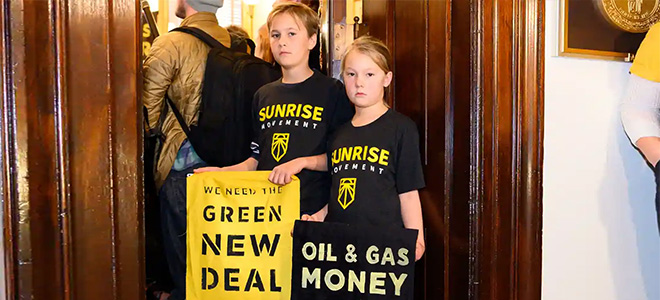
Here’s how they can do better ahead of 2020
Photo: Young protestors hold placards at the office of U.S. Senator Mitch McConnell during a Green New Deal demonstration (Michael Brochstein/SOPA Images/REX/Shutterstock)
The Guardian
by Emily Holden
America elected Donald Trump at the end of the hottest year ever recorded, without debate moderators asking him a single question about global warming.
But after three years of record temperatures, devastating wildfires and some of the most destructive hurricanes in US history, the media is facing new pressure – often from the candidates themselves – to give the subject more prominence during the 2020 election.
Yesterday, MSNBC devoted more than five minutes to Beto O’Rourke’s rollout of a $5tn climate plan, calling climate a “kitchen table issue” for 2020. Jay Inslee, the Washington governor who is seeking to make climate change the central thrust of his campaign, is calling on the Democratic National Committee to host a debate solely focused on climate. Bernie Sanders raised the issue during his town hall on Fox News earlier this month – and even drew cheers from the audience when he talked about new jobs in the renewable energy sector. Rising temperatures and the crisis they pose for humans were part of every Democratic candidate’s pitch during CNN’s marathon of hour-long town halls last week.
In the run-up to 2020, as newsroom leaders grapple with their mistakes in the 2016 election – from reliance on inaccurate polls to underestimating the impact of fake news – the failure to press candidates on climate change is emerging as an area of self-examination.
“In 2016 there were almost no questions asked , which is insane,” says Tony Bartelme, a senior reporter who covers climate change for the Post and Courier in Charleston, South Carolina. “It’s a good start that we’re starting to hear questions for 2020.”
The Guardian is joining forces with Columbia Journalism Review and the Nation to launch Covering Climate Change: A New Playbook for a 1.5-Degree World, a project aimed at dramatically improving US media coverage of the climate crisis. The project kicks off today with an event at Columbia Journalism School featuring CJR’s editor-in-chief, Kyle Pope, the Nation’s environment correspondent, Mark Hertsgaard, and the Guardian climate columnist Bill McKibben.
The Green New Deal – progressives’ vision for slowing climate change without further burdening the poor – has also helped catapult the subject into the 2020 conversation. In March, MSNBC’s Chris Hayes took the highly unusual step of devoting an hour to the idea, in a show featuring the New York congresswoman Alexandria Ocasio-Cortez.
But even as there are signs that airtime for climate is beginning to increase, questions remain about the depth and quality of the coverage. “I don’t see the media paying much attention to differentiating how serious each candidate is on the climate question,” said David Gelber, the creator and executive producer for the Showtime series on climate change, Years Of Living Dangerously.
More Americans than ever are worried about climate change. A poll of likely Democratic caucus-goers in Iowa ranked climate change about on par with healthcare as the top issues they want candidates to talk about.
Research indicates that major national newspapers are beginning to pay more attention to climate – but local publications and TV news haven’t kept up. The major broadcast networks – ABC, CBS, NBC and FOX – spent just 142 minutes on climate change last year, according to one calculation from the progressive group Media Matters. And about half of Americans hear about global warming in the media once a month or less, according to surveys by climate communications programs at Yale and George Mason universities.
Meanwhile, five major national US newspapers – the Washington Post, the Wall Street Journal, the New York Times, USA Today and the Los Angeles Times – have, in aggregate, roughly tripled their coverage of climate change since four years ago, according to the Media and Climate Change Observatory at the University of Colorado in Boulder. Read more …

